 Chickens, like all things in nature, are a part of the ever changing seasons. Their bodies react and prepare for the next coming stage in life, the next spell of weather and climate. Below are three timelines;
Chickens, like all things in nature, are a part of the ever changing seasons. Their bodies react and prepare for the next coming stage in life, the next spell of weather and climate. Below are three timelines;
The Seasonal Timeline
The Housekeeping Timeline
The Anatomical Timeline
These are approximate predictions to help the chicken keeper anticipate what will happen with her flock, how often basic keeping activities are required, and how to relate to a chickens anatomical clock.
Seasonal Timeline
Late Winter
Start researching breeds you’d like to add to your flock the coming spring.
Locate breeders or hatcheries.
Early Spring
 Chicks begin to arrive in feed stores.
Chicks begin to arrive in feed stores.
Get out the calendar and decide when is a good time to purchase birds for your climate. They will be ready to go outside in approximately 4-6 weeks depending on the breed.
Winter bedding should be removed and a thorough cleaning of walls, floor, roosts and egg boxes.
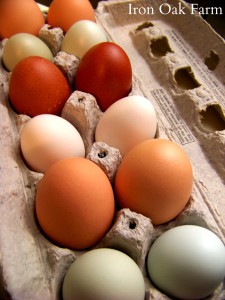 Spring
Spring
Egg season begins! Your mature hens from the following year will start producing an abundance of eggs.
Separate breeds for mating clean lines
Collect eggs for incubators
Set up brooders fro young chicks
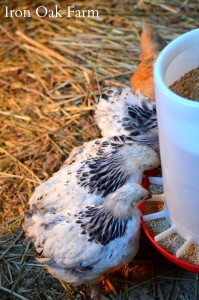 Late Spring
Late Spring
Spring chicks should be feathered out and ready to join the adult flock.
Early Summer
Start preparing for warmer temperatures.
Waterers should be cleaned out regularly, and bedding changed often.
Summer
Young cockerels might begin to test out their crowers
Meat birds should be ready for market
Prepare show birds for late summer fairs
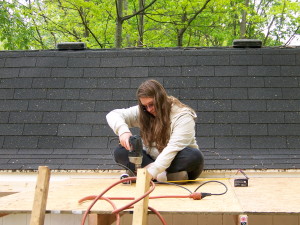 Late Summer
Late Summer
If you’re new to chicken keeping this is a great time to start building your chicken coop for first chicks the following spring.
Egg production might wane for mature hens
Spring pullets may begin laying their first eggs
 Early Autumn
Early Autumn
The molt is in full swing
Let the chickens clean up the garden area
Freshen sand bathing areas
Broiler chicks can be brooded for late autumn harvest
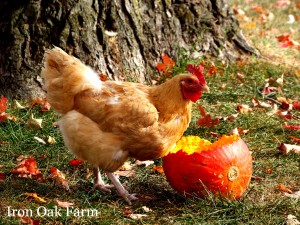 Autumn
Autumn
Purchase/set up waterers that won’t freeze.
Secure coop for cold temperatures
Late Autumn
Give the coop a good cleaning before deep liter method begins.
Consider switching to a higher protein feed
Early Winter
Egg production will be very low
Offer kitchen scraps to replace free range forage
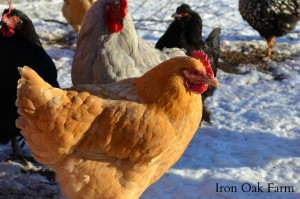 Winter
Winter
Check for frostbite on comb tips and toes
Dream about the egg you will collect in the spring
Housekeeping Timeline
How often should the coop be cleaned?
Everyday the coop should be tidied and egg boxes refreshed.
In the Summer the coop should be cleaned once a week. Removing all bedding and replacing with fresh. In the winter deep liter method can be used. New bedding should be added to the old once every week to week-and-a-half.
Always clean if there is an odor.
How often should the waterers be cleaned?
They should be rinsed out every day.
A good cleaning with scrub brush and vinegar once a week.
How often should the run be cleaned?
Depending on the size of the run, once every week to two weeks.
Anatomical Timeline
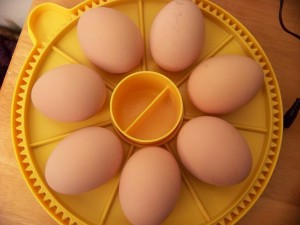 How long does an egg stays viable after laying?
How long does an egg stays viable after laying?
Approximately 7 -14 days in correct temperatures.
How long a hen stays fertile?
A hen will lay fertile eggs for approximately 6-10 days after mating.
Incubation time for an egg?
21 days
Average life of a chicken?
6-10 years
Do you have things to add to this list? Share your comments below or visit the Community Chickens Facebook Page!













2 Comments
Oly give more explanation for chicken lay only 14 days not more fir example why not 21 days
Regards
I have a question about getting the coop ready for winter. We have well insulated coop that is approximately 10X12. It has a concrete floor and is well ventilated. We have 15 hens, one rooster. Threre are roosts and 14 nesting boxes. I put down some hay on the floor to begin insulating it before it gets too cold but the ammonia smell took over right away…..should I not use hay or other types of litter? Will the chickens be warm enough this winter given the concrete floor can be very cold? We live in zone 8. I have cleaned out the coop which we do every other week by pressure washing the floor and walls. I’m afraid that doing so in the winter will make the coop much to cold and damp for my girls…
Thank you for your help,
Debora